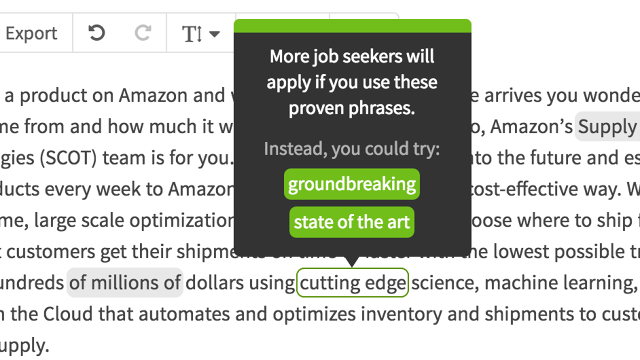How Artificial Intelligence Will Make You A Better Writer
The best way to make your writing better is to show it to someone who knows the topic at least as well as you do. That someone can now be an artificial intelligence system that reads and learns faster and more deeply than a human can, says linguist and cognitive scientist Kieran Snyder. Her company, Textio, has launched a new AI web service called Opportunities that she says can figure out what you are trying to say and suggest better ways to do it—within 0.3 seconds.
The claim is tempered by the fact that it’s limited (for now) to helping companies with job postings and recruitment emails. Some of the examples Textio showed me: suggestions to replace “focused on” with “passionate about” or “expanding businesses” with “rapidly growing businesses.”
That may seem minor, but any tool promising to grab a candidate’s attention could be important in hot technology sectors where scarce talent like software engineers have their pick of super-lucrative job offers.
Textio’s work is interesting beyond job recruiting, though. It shows the potential of AI to not only understand complex thoughts, but also the huge amount of work required to develop that understanding in even one topic area.
Say What I Mean
Were Textio coming out of nowhere with this promise, it might be a hard sell. But the company, founded in 2014, claims that thousands of companies are already using a simpler version that flags good and poor wording in a text—such as sexist language and stale clichés like “team player.” Big clients include Bloomberg, Capital One, Microsoft, Slack, and Twitter.
“[Previously] we would recommend a better way to word things when there was something broken,” says Snyder, Textio’s cofounder and CEO. “We had enough data to say, you know what, ‘best practices’ is just a clunker phrase.”
Textio gleans that insight by using AI to ingest millions of job postings, see how the language is evolving, and rate phrasing by more than a half dozen criteria such as the number of applicants a job gets, the percentage qualified enough to get interviews, and how long it will take to fill the position. “Big data” is no longer a cool phrase, for instance. “Awesome” is a popular adjective in job listings for San Francisco, but not for New York City.

“[Opportunities] is quite different, because Textio can sense what you mean and show you better ways to say it,” says Snyder, “even when there’s nothing technically wrong with the words you’ve chosen.”
Take a posting for a data scientist at Amazon. When I pasted it in Textio’s online editor, it suggested changes to the passage, “This team is focused on saving hundreds of millions of dollars using cutting-edge science, machine learning, and scalable distributed software . . . ” Based on what’s worked in other postings, Opportunities recommended replacing “focused on” with “passionate about” and “cutting edge” with “groundbreaking” or “state of the art.”
Those little changes took the posting’s overall rating from Fair to Above Average. What’s significant is not just that Textio has a cute little scoring system for verbiage, but that major corporations think it’s worth paying for (starting at $129 per user per month).
People Are Hard to Understand
The challenge with trying to refine text, rather than just flag problems, is that tweaks have a ripple effect, says Jensen Harris, Textio’s CTO and cofounder. (He and Snyder are former Microsoft engineers; Harris oversaw user experience for both Office and Windows.) “Changing a phrase in the first sentence doesn’t just change the first sentence; it actually affects the entire document and the score,” says Harris. “You actually test every version of all the meaningful phrases that could be swapped in, and score all those, and have them come back to you in 300 milliseconds.”
The process Textio goes through is a good illustration of how computers parse words, using a method called Natural Language Processing (NLP). First, the service finds all the “potentially meaningful phrases,” as Snyder calls them. In “cutting edge science” for instance, “edge science” doesn’t mean anything, but “cutting edge” does. The algorithms then come up with all the alternatives to these meaningful phrases and weed out any that don’t fit the context. “Cutting edge” doesn’t refer to knives in a job description. Finally, it takes the options that are left and checks them against Textio’s inventory of words and phrase to recommend ones found in the most-successful job descriptions.
All this works only for tweaking job postings—and in a beta service for recruiting emails. “You really need a corpus that is domain-specific to be able to identify with your software the patterns that work,” say Snyder. “So, the language that works for hiring and recruiting is really different from the language that you would use if you’re writing an email to your boss.”
Textio expects to get into more kinds of business writing, such as performance evaluations. That’s not such a jump from job recruiting, but the company is really cautious about promising additional services until its AI has digested a lot of examples. Textio has gotten requests for many other types of content. “It’s not to say we couldn’t do dating profiles,” says Harris, “but there’s so much appetite for business text.”
It will be a long way to a writing teacher in a box—a service that can analyze text on all kinds of topics and propose edits to make them better. However, AI can obsessively track constantly changing vogue terms and writing styles in a specific area and make recommendations based not on intuition but on statistics.
It’s like Moneyball for writing, says Harris. “During the hundred years of baseball that existed before analytics, coaches or managers developed ideas of what seemed to work,” he says. “Then all of a sudden analytics came, with outcomes data, and it turns out that a lot of the knowledge that people thought they had for a hundred year was totally wrong.”
The narrow abilities (for now at least) of AI-based wordsmithing could be encouraging for people who love language. Textio isn’t going anywhere near poetry or love letters, for instance. The company isn’t even trying to change overall style for the less artistic writing it does cover: It’s just tweaking a few phrases that are likely to nudge results. “That’s why we don’t do paragraph-level rewrites; that’s why we don’t do full sentence-level rewrites,” says Snyder. “You need a place for the writer’s voice or even the company’s voice to come through, if they want real results.”
Fast Company , Read Full Story
(38)














